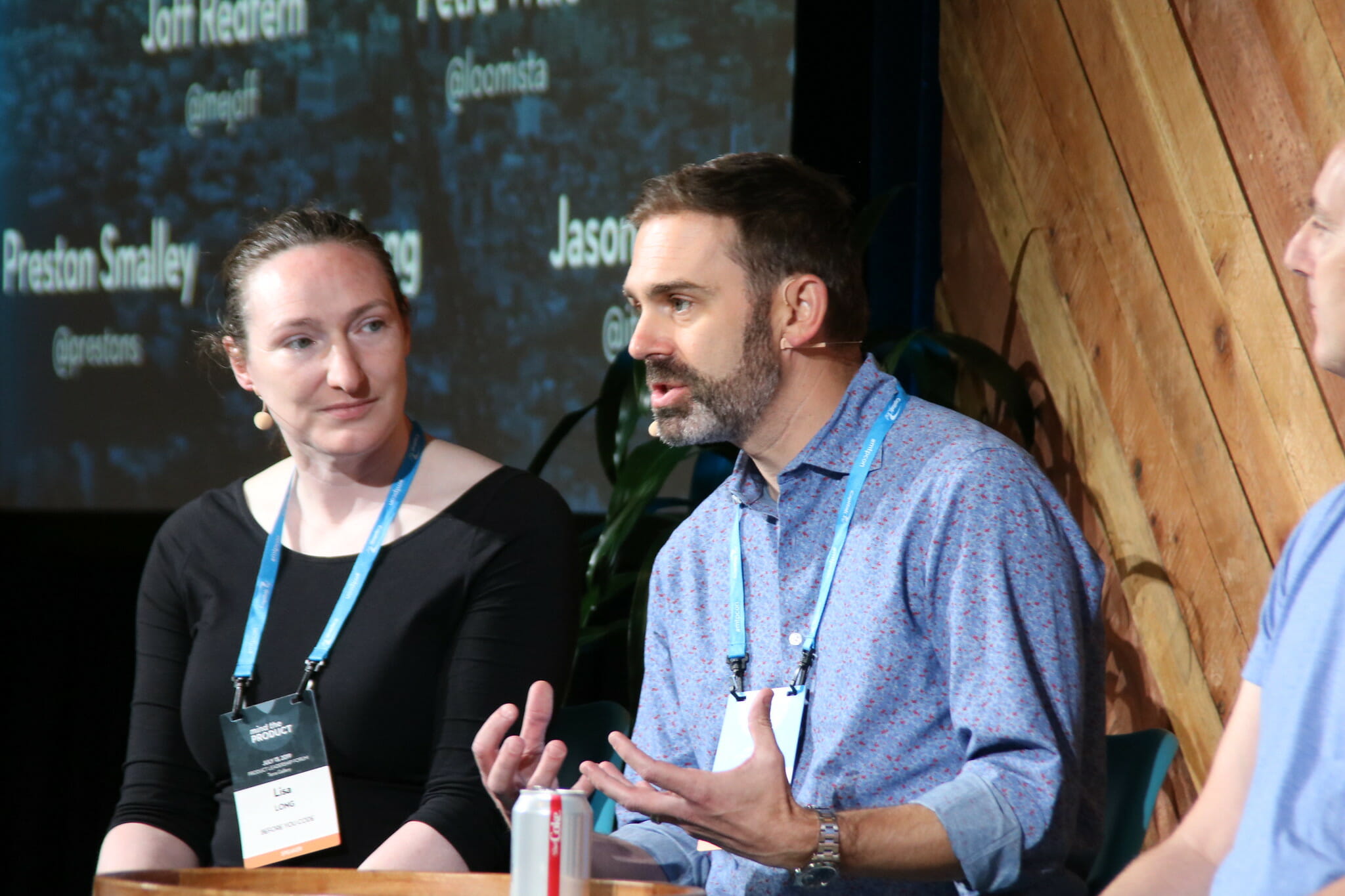Insights From the #mtpcon San Francisco Product Leadership Forum [Mind the Product]

As product management evolves, so do the challenges and questions facing product management leaders. At last week’s #mtpcon San Francisco Product Leadership Forum, senior product professionals got together to discuss the current hot topics of career paths, talent management, and psychological safety.
 Here are some of the insights that surfaced during this year’s forum.
Here are some of the insights that surfaced during this year’s forum.
Theme 1: From Product Management to People Management
Top Tip: Be authentic, vulnerable, and honest about your motivations.
Spotting a Prospective People Manager
Consider what’s driving someone who wants to manage people. Ask the individual about their motivation. Do they understand what the job entails and not just what they’ll get out of it?
Prospective people managers demonstrate management attributes before they officially become a manager. Look for the people that are mentoring an intern, running a meeting, or organizing an initiative for the team. No one should be surprised by the promotion.

Managing People Isn’t for Everyone, and That’s OK
Do you care more about the outcome that a group of people can arrive at, or the specific role you will play in getting to the result? If the craft is what you love doing, then management may not be for you.
Product leaders should think about how to support and develop all product managers, without assuming they want to become people managers. Some companies address this with equal, parallel management and individual contributor (IC) tracks.
Transitioning From Individual Contributor to Manager is Hard
The transition from an individual contributor to a manager is hard. We tell people to stop doing what they’re good at and don’t give them the support they need to be great.
Often new managers hold on to their IC work because it was so much of their identity and they worry about not keeping their skills fresh. However, if you still have IC work, you either aren’t giving your new team enough support or you’re failing in the IC responsibilities.
Your job as a manager is to enable the best outcomes and results from your team, not for you to be the best. If the manager is the best at everything then they don’t have a very strong team.
 Management Can’t be Learned From a Book
Management Can’t be Learned From a Book
Books can help, but they aren’t a substitute to learning about management by doing.
Management is about working with people, and people are infinitely complex. It’s hard to recreate how you’ll feel in different situations, but with experience it won’t scare you as much.
Support for Product Leaders can Come From Anywhere
It’s important to find your support network. They can reassure you and help you not feel as alone.
Mentors can range from parents to work colleagues, and peer groups.
Theme 2: Talent Management
Top Tip: Be explicit about expectations and creative in defining paths to Product.
Define What Product Management Means to Your Company
The product management role is fuzzy, and many companies don’t define what product management means to them. This isn’t fair to your current team or to anyone who wants to join them.
Be explicit and deliberate. Set expectations through your job architecture, hiring, performance reviews, and growth conversations.
Don’t go overboard with your product management competencies. Keep them simple, clear, and realistic. And don’t expect your product managers to be an expert in everything: they should be well-rounded but have a forte.
 Spotting a Prospective Product Manager
Spotting a Prospective Product Manager
Product management jobs can be seen as an escape route or an easy path in to tech. Be clear about roles and responsibilities and get creative in how you assess potential product managers.
For example, experiment with short-term secondments to the Product team and ask questions to unearth motivations. “If you don’t join the Product team at this company, would you leave to do Product elsewhere?”, can reveal the real driver.
Is Communication the Most Important Product Management Trait?
LinkedIn asked: “What are the traits of the top 1% of product managers?” “Communication” was the top result, double that of all other results. Does this apply to the product managers you know?
You’re Developing a Team, not a Family
It’s easy as a manager to get defensive about your team and to want to believe they’re great all the time. But your team isn’t your family. Sometimes you need to listen to the feedback from outside your team to improve.
 Theme 3: Psychological Safety
Theme 3: Psychological Safety
Top Tip: Be proactive in measuring, spotting, and changing toxic environments.
What is Psychological Safety?
Psychological safety is about being open, honest, and accepted. It’s not always comfortable, and will sometimes feel bad.
Look out for Psychological Safety red Flags
Keep a look-out for the signs that the team doesn’t feel psychologically safe. For example: no one speaking up in meetings; people questioning management decisions in a back channel to you; no one correcting someone saying something inappropriate; leaders asking for feedback but dismissing everything they hear.
Psychological Safety and Product Management
Product managers have to take personal risks to create psychological safety for their team. Creating a healthy team environment often means saying “no” to leadership requests, but in many companies this can have a negative impact on the product manager’s rewards and recognition.
As a product management community, we need to consider:
- How do we better align the conditions for psychological safety with rewards and recognition for product managers.
- How much risk are we willing to take on as product leaders? How can we model that behavior?
 Measuring Psychological Safety
Measuring Psychological Safety
There are ways to measure the psychological safety in your company. For example: could you:
- Gather and act on anonymous feedback about the team and yourself as a leader.
- Run quarterly health checks.
- Count the number of hops in a conflict. Are people responding to issues directly or passing it to someone else? Ask: “What did this person say when you talked to them?”
Changing a Toxic Environment
In a toxic environment, the team will be doing the minimum necessary to get by.
Be purposeful about changing this environment. What’s the situation today and how do you want it to look in the future?
Don’t just pay lip service to change: make it real through your actions each day. Be realistic: it may not be possible to change every organization, but it is possible to create safety with your team and the group of people you work with.
Psychological safety isn’t once-and-done. People need to experience the new normal multiple times to believe it.
Improving the Relationship With Sales
The relationship between Product and Sales can be tricky and exacerbate psychological safety problems in the company. There are ways to increase trust and work together better:
-
- Be transparent and have conversations about outcomes rather than just features.
- Invite Sales to join the conversation and Product process. For example, joining weekly Product demos or standups may help them to sell what the team’s building and to demonstrate that Product is a partner rather than a hurdle.
- Find low-hanging fruit that will help to build the relationship.
- Invite Sales to a regular Product counsel where the roadmap, requests, feedback and tradeoffs are discussed. Having everyone in the same room will make the prioritization process clearer.
Psychological Safety for Consultants Working With a Toxic Client
When clients don’t create a safe space for a consultant team, the consultants may feel frustrated and disempowered.
Give feedback to the client and coach them if they’re open to it, but be prepared to walk away. Consulting companies need to look after their employees, and should protect their greatest assets.
———————————————————————————————————————-
Resource Recommendations
Drive – Dan Pink
Radical Candor– Kim Scott
Project Aristotle report on the secrets of effective teams at Google
Collaborative Gain for peer feedback.
Culture Amp for quarterly health checks.
The post Insights From the #mtpcon San Francisco Product Leadership Forum appeared first on Mind the Product.
Source: Mind the Product https://www.mindtheproduct.com/2019/07/insights-from-the-mtpcon-san-francisco-product-leadership-forum/

Post a Comment